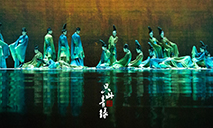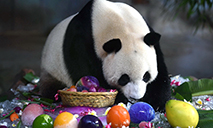Across China: Locals paint prosperous lives in hometown of Chinese brush pens
NANCHANG, Sept. 5 (Xinhua) -- Zhou Pengcheng, 76, has dedicated his life to the centuries-old intangible cultural heritage of making writing brushes.
Zhou, who hails from Wengang township in east China's Jiangxi Province, has been engaged in this ancient handicraft for more than six decades.
Wengang's long-standing tryst with brush pens dates back to 1979, and over the decades the town has grown into one of the country's biggest brush pen markets, attracting tens of thousands of buyers from across China.
In Chinese culture, writing brushes are counted among the "four treasures in the study," and Wengang is known as the "hometown of China's writing brush."
More than 400 brush-making enterprises and over 2,200 brush workshops are located in the township. And almost every family in the town makes their living through the brush manufacturing industry.
Zhou has been working in this sector since he was eight years old, and his family has been engaged in this ancient craft for nine generations.
"In the 1970s, writing brushes made in Jiangxi were not so well recognized by people in China and the rest of the world, which propelled me to improve and adjust brush-making techniques according to the needs of customers," said Zhou, adding that he finally succeeded after about eight years of hard work.
The craft of making writing brushes in Wengang involves 128 steps. The local brushes have managed to make a mark in the overseas markets, such as Asia, Europe, and the United States, and particularly in Japan and the Republic of Korea.
"I found calligraphy fascinating, especially the power and visual impact of Chinese calligraphy," said Alister Inglis, professor of Chinese Language and Literature at Simmons University. The foreign teacher takes interest in how the shape, length and bristles of the brush reflect the type of written characters.
In June, Wengang's brush-making skills were listed as a national intangible cultural heritage, said Wu Shaoyun, Party chief of the town.
"Since the beginning of this year, we have mainly focused on how to transform the brush-making industry into a cultural industry. We have been working hard to improve the techniques and further inherit this craft," said Wu.
Currently, the town is eyeing for a new boom in the e-commerce era. It has launched customized services to better meet customer needs in the culture, tourism and e-commerce sectors.
Photos
 Dance show saluting traditional culture of the Song Dynasty makes its debut
Dance show saluting traditional culture of the Song Dynasty makes its debut Village in SW China’s Yunnan embraces prosperity through agricultural tourism
Village in SW China’s Yunnan embraces prosperity through agricultural tourism Eighth birthday for pair of giant pandas celebrated in Haikou, Hainan province
Eighth birthday for pair of giant pandas celebrated in Haikou, Hainan province Olympic gold medalists portrayed in Shanxi artist’s polymer clay sculptures
Olympic gold medalists portrayed in Shanxi artist’s polymer clay sculptures
Related Stories
- China increases gov't procurement in 2020: ministry
- China strengthens regulation of medicine use
- China to integrate student health education and all-round development
- Infographics: Highlights of China's whole-process democracy
- Rising living standard in China is important achievement -- Cypriot party leader
- China renews yellow alert for heavy rainstorms
- Cao leads 1-2 Chinese finish in men's 10m platform at Tokyo Olympics
- Aerial view of Hulun Buir in north China
- China’s youngest Olympian wins national respect for spirit
- China's Liu Shiying wins China's first Olympic women's javelin gold at Tokyo 2020
Copyright © 2021 People's Daily Online. All Rights Reserved.






